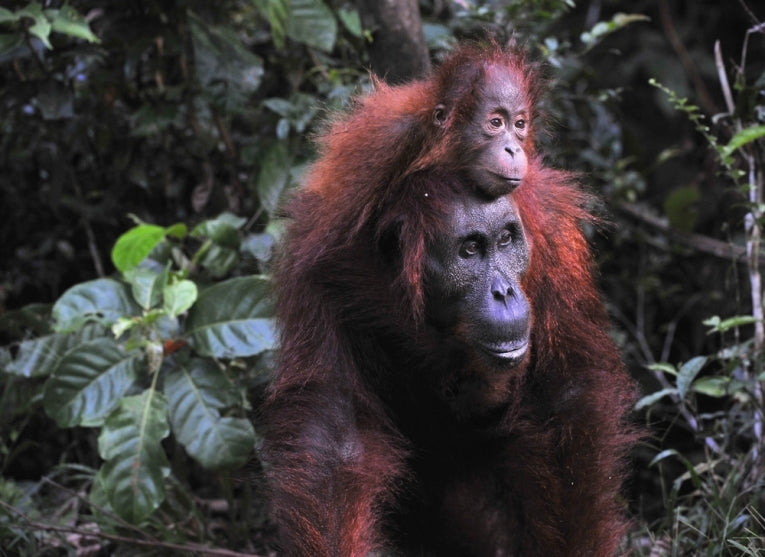Indonesian, Malaysian and Australian researchers, led by Erik Meijaard, have produced a shocking result from an analysis of human/orang-utan conflict in Kalimantan, Indonesia. In their view the orang-utan is being killed at a rapid rate. The serious threat to the endangered ape had been thought to be lack of habitat as well as hunting and conflict with agriculture, but the figures reveal more than 3000 deaths a year on some calculations. A minimum of 750 were killed in the last year. The geographical and social influences are the most telling figures for those now urgently seeking ways to find solutions in areas where most orang-utan deaths occur.
Pongo abeliiand P. pygmaeus are understudied to such a degree that this is the first attempt to quantify orang-utan deaths due to hunting or conflict. The three provinces of Kalimantan border both Brunei and Malaysian Borneo, with several towns near the coast. Most important to such a study of people were their demographic characteristics, orang distribution and agricultural conflicts, as well as legal knowledge and many variables affecting the killing.

Potential distribution area of orangutan in Central Kalimantan (yellow), West Kalimantan (purple) and East Kalimantan (green), and the village area boundaries within these regions; Credit: PLoS ONE
The methods of questioning and the range of villages selected were carefully fitted to a 2004 Population and Habitat Viability Assessment distribution range. 40% of the 1717 villages chosen were in suitable types with varying land use characteristics, resulting in a final random sample of 687.
In most cases, ten residents were selected carefully from each village and reliability of questions and answers checked. The ID of the animal could have caused havoc, so nine mammals were presented to each respondent and only high level answers (from 70%) allowed that person to be classed as "reliable."
As you can imagine, even the sizeable number of researchers found it difficult to avoid missing data. Statistics helped to produce correlations however and estimates were prepared with all the necessary data for spatial analysis, religious bias, village size, degree of deforestation, etc. One example is that only 8 women reported any killing, so the data was thought to refer to males aged 15 or over. In these provinces, Dyak indigenous tribes are in the majority, followed by Malay, Banjar and Kutai people and immigrants such as nomadic people, Javanese Buginese and Balinese.
Only 4.9% responded by admitting a killing themselves, but a few reported killing large numbers. Food was the most common reason for the killing (54%), followed by self-defence and pest of crops. Selling baby orang-utans was not a common reason given.

Baby orangutan (Pongo pygmaeus) swinging in tree. Borneo, Indonesia via Shutterstock
A highly significant association was found between killing and conflict reported in villages. From all the reliable responses, killing rates ranged from 4% to 23%, increasing with the amount of conflict. Although, overall, few respondents mentioned that conflict exists, people such as loggers and hunters who spent time in forests, mentioned conflict much more. Palm oil, rice and commercial forestry regions have most crop raiding incidents, especially in East Kalimantan, where almost no natural forest remains. The authors are hoping for more detailed work on specific areas as the proposals resulting from this extensive survey are acted out.
A major worry is studies showing that if annual mortality of adult females exceeds 1%, then that population will approach extinction. Luckily, Indonesian law has long prohibited these killings and although local custom laws seem often ignored, some peoples revere "the old man of the forest." The real reason for the deaths would also be papered over if the respondent was aware of the legal situation (this was also part of the questioning). Opportunistic killing is indicated strongly by the survey, in that few people actually kill and most kill only once or twice in their lifetime. Stopping the killing may be easier if these opportunists are affected by a targeting of hunters as well as making the killing less socially acceptable. Such major threats to the orang-utan need institutional and legal reaction, but the WWF and all other conservation bodies need a re-think on our general approach to orang-utan conservation. This major work on a much-loved species deserves the worldwide response it patently needs.















